Maritime Agencies
Oyetola Opens LIMWEEK 2024, Harps On Port Efficiency and Safety
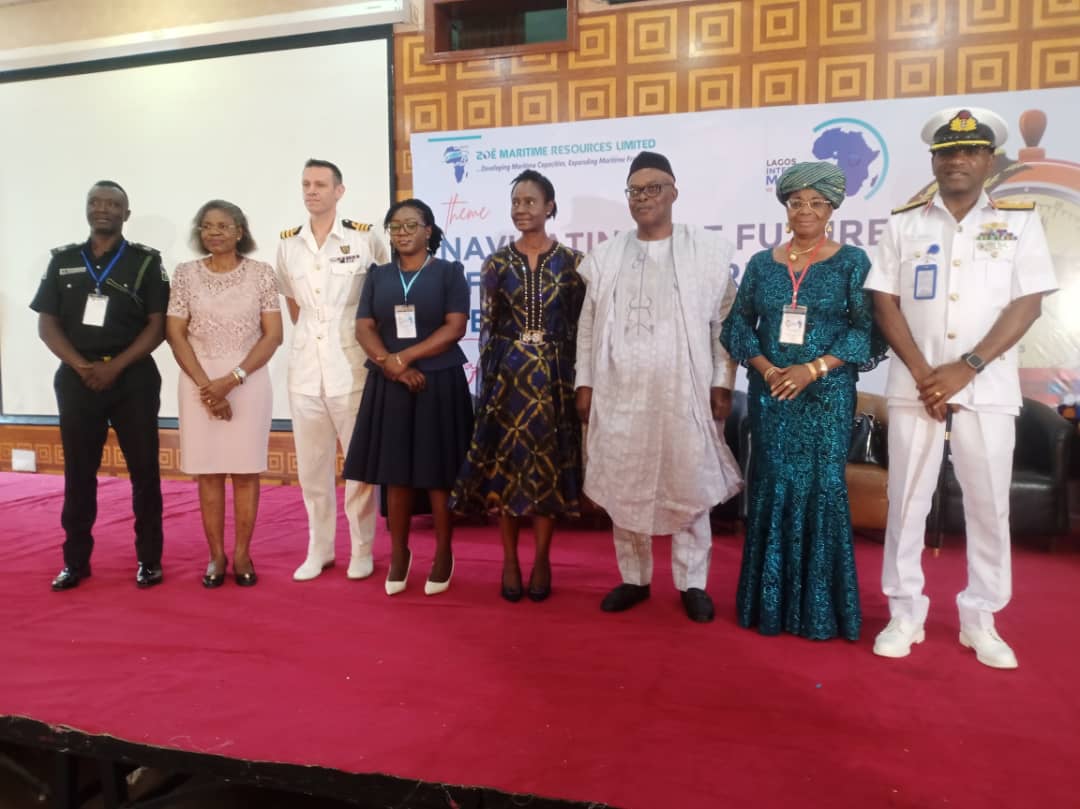
By Izuchukwu Ozoemena
Nigeria’s Marine and Blue Economy Minister, His Excellency Adegboyega Oyetola says in the maritime world, port efficiency and safety are critical components that can never be overlooked while discussing economic growth, trade and investment.
The Minister stated this in Lagos, Tuesday, while declaring open the 2024 edition of the Lagos International Maritime Week (LIMWEEK) and the Business To-Business Conference and Exhibition with the theme ‘Navigating the Future of Africa’s Marine & Blue Economy – Safety First.’
Improvement in safety and ports efficiency, he explained, top the chart on the responsibilities President Bola Tinubu handed to him to achieve as Minister.
The Minister, who was represented by Mr Chinedu Mbam, Legal Director in the Ministry, added that government was fully committed to drive the modernisation and improvement of the ports and maritime infrastructure.
By upgrading the nation’s ports to global standards, he noted, Nigeria will position herself to become a leader in international maritime trade since ports serve as gateway to prosperity.
“We understand that port efficiency and safety are not options; they are imperatives for unlocking the full potential of the blue economy. This is significant because safety remains the cornerstone upon which all maritime operations and business success rest.”
Through key safety initiatives such as the Deep Blue Project, he explained, Nigeria and, indeed the Gulf of Guinea, have achieved reasonable reduction in maritime crimes such as piracy, sea robbery and smuggling.

Mrs Sofiye Uzor (Centre) receiving the Award on behalf of Engr Greg Ogbeifun.
In his contribution, the Lagos Star Commissioner of Police acknowledged his responsibility to secure the maritime domain, including the intricate inland waterways crucial to Nigeria’s economy and Africa’s broader maritime sector. “The Gulf of Guinea, as many of us are aware of, is both a region rich in resources and a key artery for global maritime trade also faces persistent security challenges. The Nigeria Police, through its Maritime Command, has played a pivotal role in securing our maritime domain. Our mandate extends beyond merely patrolling the waterways. We work hand-in-hand with other national and international agencies to protect vital assets, combat piracy and ensure that our marine environment is safe and secure for all stakeholders.”
The Police boss who spoke through Chief Superintendent of Police Segun Falemara said as a matter of routine, the Police collaborates with NIMASA and other critical stakeholders in joint operations to reduce maritime crimes.
“The Marine Police deploys advanced surveillance techniques, leveraging human intelligence and technological solutions to monitor criminal activities along the waterways.”
“Through regional and international partnerships, we ensure our officers are well trained to address emerging maritime threats and security challenges.”
To achieve reasonable security in the Gulf of Guinea, he suggested a coordinated effort from the component littoral states and international partners.
Nigeria, he recalled, has been at the forefront of fostering regional collaboration to ensure a safer maritime environment.
“Some of these include the AGWE Project and the SWAIM SAR Project.” The AGWE Project anchored by the Interpol is a collaborative programme of five West African states aim at training, mentoring and providing equipment for boosting maritime security while SWAIM (Support to West African Integrated Maritime Security) have enhanced the search-and- rescue capabilities in the Gulf of Guinea.
“These initiatives have improved the region’s ability to swiftly respond to maritime emergencies and criminal activities, fostering safety on our waters”. He explained that the United Nations Office on Drugs and Crime has been invaluable in supporting Nigeria’s efforts to combat piracy and armed robbery at sea.
“Through UNODC, the Danish government has funded training programmes that have equipped our offices with Visit, Board, Search and Seizures (VIBSS) procedures in conjunction with the Nigerian Navy to combat illegal activities at sea.
On the proliferation of dangerous materials, he said that partnering with the International Atomic Energy Agency (IAEA) and the US International Counter-proliferation Programme, Nigeria has worked to prevent the smuggling of hazardous materials and weapons of mass destruction into the Gulf of Guinea. This is a critical step towards ensuring that the blue economy is not compromised by illicit activities that would have devastating environmental and security consequences.
The Suppression of Piracy and Other Maritime Offences Act, 2019, he said, has significantly strengthened Nigeria’s legal framework for tackling piracy and other maritime crimes. “It aligns our national laws with international frameworks and provide the necessary legal backing for prosecuting offenders in Nigeria.”
Through the Harmonized
Standard Operating Procedures (HSOPs), efforts are on to ensure that regional maritime security agencies adhere to harmonized SOPs, ensuring a “legal finish” in prosecuting maritime offenders.
Nigeria participates actively in national and regional maritime security conferences such as the Yaounde Architecture for Maritime Security which facilitates coordination between West and Central African states. Mentoring programmes including training supported by international partners such as the US and European Union have played a key role in improving Nigeria’s operational capabilities. “The Nigeria Police also contributes to the 2050 Africa’s Integrated Maritime Strategy (2050 AIM Strategy), comprehensive, concerted, coherent and coordinated approach that improve maritime conditions with respect to environmental and socio-economic development as well as the capacity to generate wealth from sustainable governance of Africa’s blue economy.”
The Police boss assured Nigeria’s commitment to the development of her blue economy through fostering safety and security across her maritime domain.
In his intervention from the perspective of the British Royal Navy, Commander Daniel Waskett, SO2 Marine, disclosed the UK strategy which is to establish long-term and mutually-beneficial partnerships with African nations to build on shared interests for safer, healthier and more prosperous future for all. However, like many nations committed to ensuring a free, secure global common maintenance of international rules-based order and supporting democracy, he stated, the UK is experiencing a time of increased operational demand the Royal Navy is deploying globally at a scale unprecedented for many years.
“Destroyers and Frigates are protecting shipping in the Red Sea to ensure trade can continue freely.”
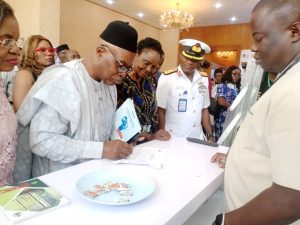
Highlight of the event, among others, was the conferment of a lifetime achievement award on Engr Greg Ogbeifun, Chairman, Starzs Marine and Engineering Co Ltd.
Maritime Agencies
Customs Bans Stemming of Containers of Pharmaceutical Products To Bonded Terminals, Hands Over N9.2bn Illegal Importations To NAFDAC
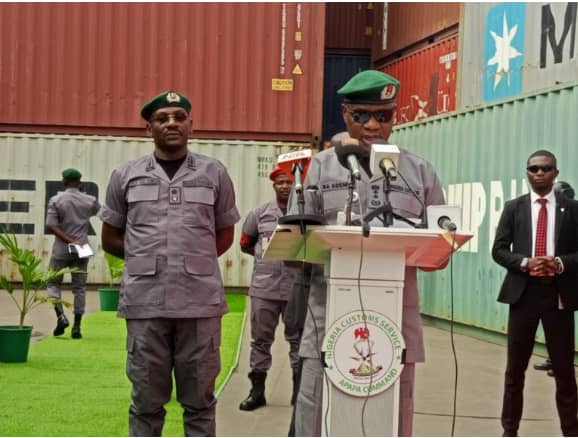
By Izuchukwu Ozoemena
Going forward, the Nigeria Customs Service has placed an indefinite ban on the stemming of containers of pharmaceutical products to bonded terminals. This is official.
Customs Controller-General, Bashir Adewale Adeniyi announced this in Lagos, Friday, in response to what he referred to as abuses and trade illegalities being perpetrated by offdock facilities.
”We will no longer allow stemming vessels down into offdock facilities. We can allow any other thing but because of the sensitive nature of pharmaceutical products and because of the abuse to which this concession has been subjected in the past, they will only be allowed or cleared in these four designated places: Apapa Port (right inside the port), Onne Port, PTML and at the International Airport. We’ll no longer allow them to be taken into bonded terminals.”
The Controller-General who was in Apapa to hand over 25 containers of unregistered and prohibited pharmaceutical products with a Duty Paid Value (DPV) of N9.2 billion to the National Agency for Food and Drug Administration and Control (NAFDAC) declared the aim of the restriction. This is to curtail the abuse by bonded terminal operators, many of whom have been implicated in the seizure of fake and unwholesome drugs.
CGC Adeniyi described the seizure of pharmaceutical products as a direct fallout of the strategic Memorandum of Understanding with NAFDAC and the inauguration of the implementation committee between the two bodies in November 2024.
Explaining the Service’s position regarding current licensing fees, he stated that the current licensing fees for bonded terminals in operation stand to be reviewed as they no longer align with current realities, haven been in place for about a decade.
”The increase in the fee of the license has to be such that it will be difficult or impossible for those who are not serious to own and operate a bonded terminal.
”So, we are already in the process of reviewing the license fee. We will carry the stakeholders along and do things that will reflect current situations”.
He acknowledged the role inter-agency collaboration and intelligence-sharing have continued to play in enforcement.
This enhanced cooperation has delivered measurable results in protecting public health and discouraging illicit trade.
”The MOU framework enables Customs and NAFDAC to conduct coordinated operations and joint investigations, systematically tracing illicit pharmaceutical sources and deploying targeted enforcement strategies against criminal networks”.
A rundown of the contents of the
21 forty-foot containers and 4 twenty-foot containers of counterfeit and dangerous pharmaceutical reveals unregistered sexual enhancement drugs like REDSUN and HYEGRA among others.
There are also codeine-containing cough syrups (including CSC brands), antibiotic injections such as oxytetracycline and artesunate, pain relief medications containing diclofenac sodium and paracetamol.
Also included are skin-lightening creams, hip and breast enlargement products and
numerous tablets bearing fake NAFDAC registration numbers. Expired food products, veterinary medications and antimalarial drugs also featured.
“The Nigeria Customs Service, in partnership with NAFDAC and the NDLEA remains uncompromisingly committed to the battle against merchants of death who pursue illicit profits from businesses that destroy lives and communities,” Adeniyi stressed.
“This MOU- facilitated coordination enables swift responses to emerging threats, and I commend the Director-General and her dedicated team whose technical expertise, combined with our enforcement capabilities, has created a formidable barrier against criminal networks seeking to compromise our borders”.
“Under the coordination of the Office of the National Security Adviser, our joint operations have resulted in the seizure of over 200 containers followed by coordinated destruction exercises, with unregistered pharmaceutical products comprising 63.7% of seizure values, highlighting the scale of threats that could have inflicted devastating damage on human lives and our social ecosystem if permitted to infiltrate our markets,” he stated.
Adeniyi who emphasized that the Service has significantly enhanced her intelligence network and technological capabilities to detect and seize unwholesome goods warned all stakeholders including haulage operators, bonded terminal owners, or any other international trade facilitator that anyone implicated in illegality stands to face the full force of the law as there are no sacred cows.
He commended commended officers and men at the Apapa Port Command for being vigilant and professional in their duties.
Maritime Agencies
Lekki Deepsea Port Set To Clinch 500,000 TEUs, Becomes Trans-shipment Hub In West Africa
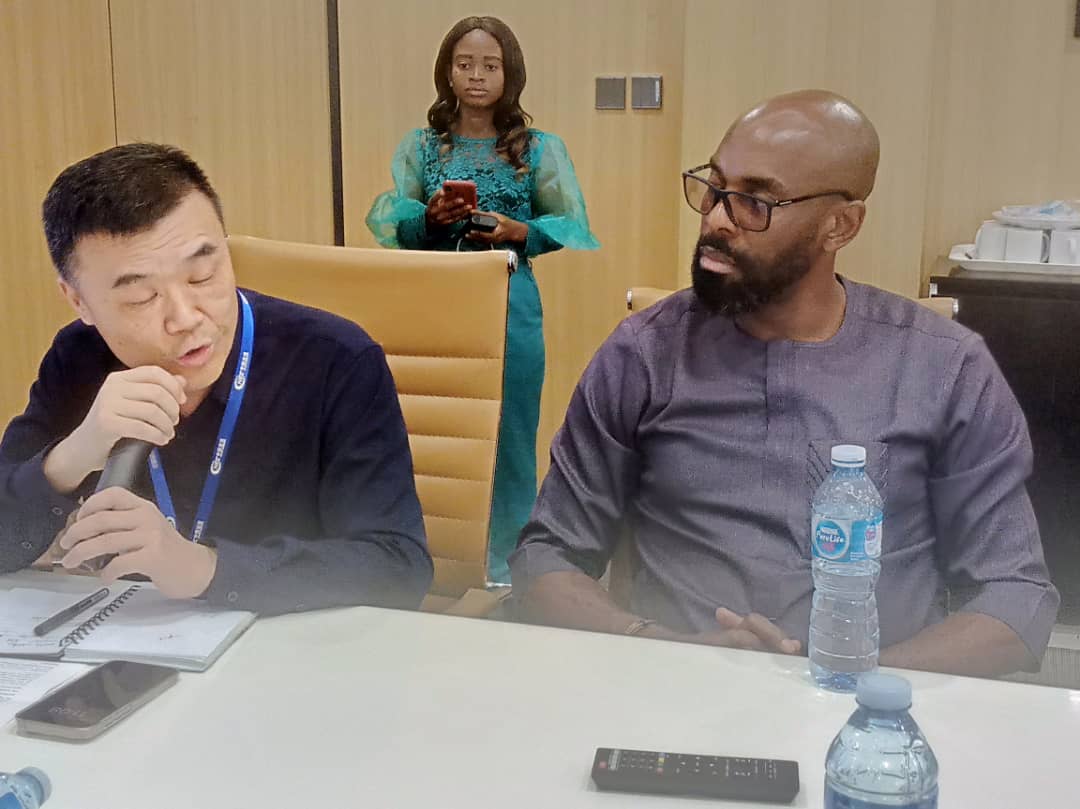
By Izuchukwu Ozoemena
Yang Xixiong, the Chief Operating Officer, Lekki Port has said the deepsea port which commenced operations in 2023 has come to place Nigeria in her rightful position as a shipping hub that has assumed her rightful position and relevance in regional and global economy.
The CEO who disclosed this in Lagos,Thursday, while rubbing minds with members of the press assured that the new port has stabilized and would, going forward,continue to raise the bar of relevance to international standards.
“We continue to push the envelope, set the bar higher to uphold our position as West Africa’s deepest sea port,” Xixiong announced.
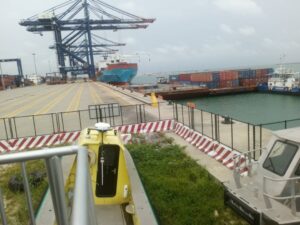
A section of critical facilities at the Lekki Deepsea Port.
“The result of our unrelenting commitment to world-class standards is visible in the gigantic footprints we are putting on the map of maritime trade in Africa, deploying technology, driving operational efficiency, and shaping regional trade,” he added.
Already, Lekki Port has commenced trans-shipment operations to some regional ports in West Africa such as Togo, Ghana and Côte d’Ivoire.
In his intervention, Daniel Odibe, Deputy Chief Operating Officer, who spoke further on the increase in trans-shipment capacity added that recently, Lekki Deepsea Port conducted a trial trans-shipment to Onne Port.
Odibe said, “We had our first trans-shipment operations in 2023, which is the first in the Nigerian economy.
Between January and June, 2025, the port processed 222,000 Twenty-foot Equivalent Units (TEUs) of cargo and has her hands steadily on the plough to jerk up the performance so as to achieve the targetted record of 500,000 TEUs by the end of the year, a development that reflects a growing confidence in the port’s ability to achieve maximum operational capacity as per international standards.
“Before now, countries like Togo, Ghana, and Côte d’Ivoire used to be the trans-shipment hubs for Nigeria-bound cargoes. You know what that means for our cargo? They spend more time coming to us. They incur more costs because they are double-handled in those trans-shipment hubs, all because Nigeria didn’t have a deep-sea port.
”The story is in our favour right now. We are now talking about international trans-shipment. We are now doing international trans-shipment to other West African countries such as Ghana, Côte d’Ivoire, Abidjan, Togo and Cotonou.
”Currently, you have ports like Warri, Calabar, Onne, and then we have inland ports like Onitsha and Burutu. Some of these ports, foreign vessels don’t go there because the draft is low. So the idea here is to have cargoes for those ports. That will open up economic opportunities in those areas.
“We did some trials last year with Onne. It had some challenges, but again, it was an eye-opener and we are looking at restarting that again this year in collaboration with the shipping lines and baggage operators.”
On cargo throughput volume, Odibe assured that cargo volumes are now gradually improving steadily despite initial hiccups arising from instability in the rate of the Dollar.
Currently, the port receives between 10-12 vessels every month. The record, he added, is steadily picking up.
“Volumes fell because of Naira depreciation and the removal of fuel subsidy; this caused a setback in our projection. As of 2023, when we started operations, we did 54,289 TEUs, and as of June of this year, we have done 222,000, and we are projecting 500,000 TEUs.”
Odibe also stated that the vessel turnaround time at Lekki Port currently stands at 48 hours as against one hour and 25 minutes for truck turnaround time, while cargo dwell time is 16 days.
Maritime Agencies
MAMAL 2025: MARAN Demands End to War Risk Premium, Set to Expose Maritime Fraud in Gulf of Guinea.
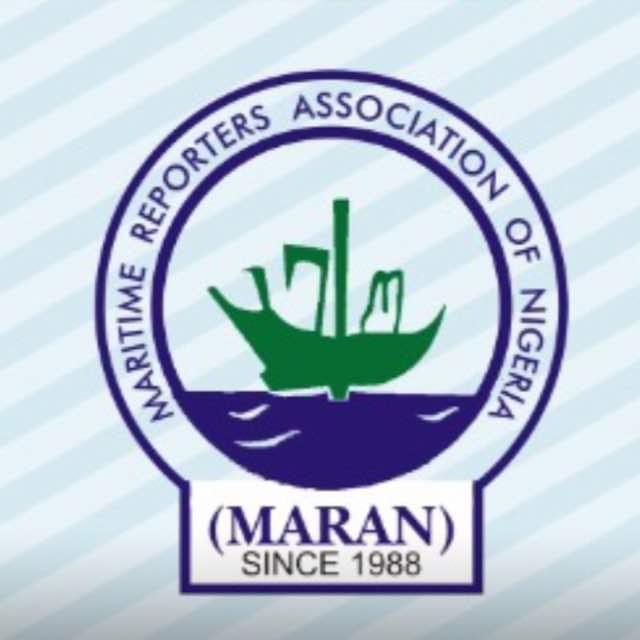
By Izuchukwu Ozoemena
Come August 28, 2025, the Maritime Reporters Association of Nigeria (MARAN) will host the 3rd edition of her annual Maritime Lecture (MAMAL) at the prestigious Eko Hotel and Suites, Lagos.
This year’s lecture will spotlight the ongoing international fraud perpetrated by foreign shipping lines under the guise of “War Risk Premiums” on vessels calling at Nigerian ports, aiming to draw the Federal Government’s urgent attention to the issue.
Speaking on the theme of MAMAL 2025 which is “Addressing the Burden of War Risk Insurance on Nigerian Maritime Trade,”MARAN President, Mr. Godfrey Bivbere, strongly condemned the war risk insurance, describing it as an international fraud burdening the economy of Nigeria and other developing countries in the Gulf of Guinea.
The extra war risk insurance (WRI) levied on Nigeria-bound vessels varies significantly. For instance, a very large crude carrier (VLCC) can incur a WRI surcharge of $445,000 per voyage, while a new container vessel may face a charge of $525,000 per voyage. Beyond this, some shipping companies such as Maersk, have introduced additional fees like a transit disruption surcharge, while others impose a war risk surcharge of $40-$50 per 20-foot container.
MARAN contends that these exorbitant charges are further strangulating Nigeria’s already-strained economy.
Also, despite Nigeria’s Minister of Marine and Blue Economy, Adegboyega Oyetola recently confirming that Nigeria has not recorded a single pirate incident in the past three years, the imposition of war risk premiums continues unabated.
Oyetola credits this peace in the Gulf of Guinea to the multi-billion naira Deep Blue Project, a robust maritime security initiative spearheaded by the Nigerian Maritime Administration and Safety Agency (NIMASA).
Despite these commendable efforts by the Federal Government, MARAN is concerned that foreign shipping lines continue to unjustly extract millions of dollars from Nigerian shipowners in the name of War Risk Insurance Premium, even though there are no demonstrable risks in the region.
In March 2025, Dr. Dayo Mobereola, Director General of NIMASA, met with a delegation from the Danish Ministry of Foreign Affairs, led by Kristin Skov-Spilling, where he passionately appealed to the international community to acknowledge Nigeria’s significant progress in securing its waters. He emphasized the critical need for a corresponding reduction in war risk insurance costs.
Dr. Mobereola stated, “The Nigerian government has demonstrated a strong commitment to maritime security, leading to nearly zero incidents of piracy and armed robbery in the Gulf of Guinea over the past four years. Despite this, vessels coming to Nigeria continue to pay high war risk premiums, which is unjustifiable given the improved security landscape.”
Speaking further on the upcoming MAMAL Annual Maritime Lecture 2025, MARAN President Godfrey Bivbere asserted that international shipping companies operating in Nigeria have shown “lackadaisical and complacent attitude towards the economic and social wellbeing of Nigeria as a nation.”
He explained that MAMAL 2025 aims to thoroughly examine the perceived threats, realities, and profound implications of persistent Extra War Risk Insurance (EWRI) on Nigeria’s maritime trade and the wider Gulf of Guinea (GoG).
Providing more details about the highly anticipated conference, which has consistently served as a crucial rallying point for all maritime stakeholders due to MARAN’s respected voice, Bivbere added:
”The Summit will also explore issues leading to the classification of the nation’s waters as high-risk zones, roles of classification societies like the Lloyds of London, the roles of core stakeholders like NIMASA, Nigerian Navy and other maritime and security operators.”
According to Bivbere, “The MAMAL 2025 is expected to draw over 500 key stakeholders, including maritime security experts, shipowners, terminal operators, international shipping lines, diplomats, insurers, regulators, and legal experts.”
-
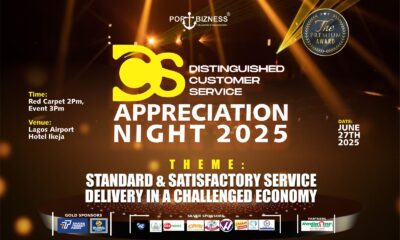
 Maritime Agencies2 weeks ago
Maritime Agencies2 weeks agoPORTBIZNESS Celebrates Excellence in Customer Service Delivery, Holds Special Awards Night
-

 Maritime Agencies3 weeks ago
Maritime Agencies3 weeks agoKebbi Customs Command Introduces Health Screening, Mandatory Sports To Ensure Work-life Balance
-
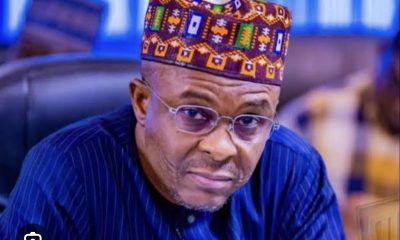
 Maritime Agencies1 week ago
Maritime Agencies1 week agoNPA Berths Nigerian-Owned Container Vessel,”MV OCEAN DRAGON,” To Boost Incountry and Regional Trade,
-
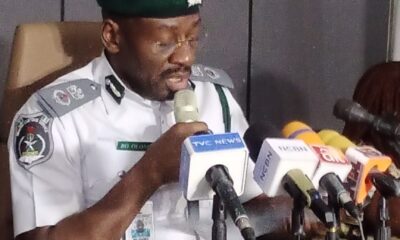
 Maritime Agencies3 days ago
Maritime Agencies3 days agoApapa Customs Revives Rail Haulage of Cargo, Shuts Three Bonded Terminals
-
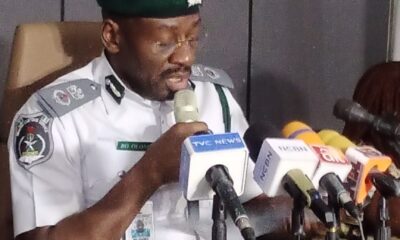
 Maritime Agencies1 week ago
Maritime Agencies1 week agoHALF-YEAR REVENUE DISPOSITION: Apapa Customs Hits N1.38Trillion, Confiscates Prohibited Goods Worth Billions.
-
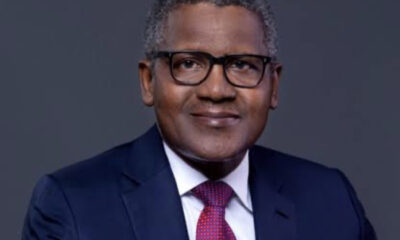
 Maritime Agencies4 days ago
Maritime Agencies4 days agoDangote Lauds NPA’s One-Stop Shop Committee, Donates Coaster Bus To Ease Operations
-
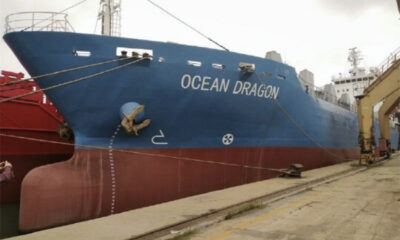
 Maritime Agencies1 week ago
Maritime Agencies1 week agoNIGERIAN PORTS AUTHORITY BERTHS FIRST WHOLLY NIGERIAN-OWNED CONTAINER VESSEL.
-
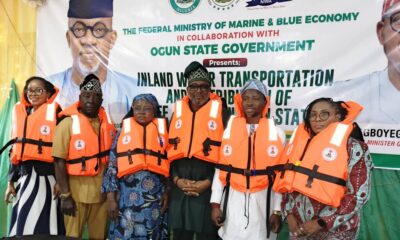
 Maritime Agencies3 days ago
Maritime Agencies3 days agoSAFETY ON WATER: FG Donates Life Jackets To Ogun State Government, Emphasizes Safety


























